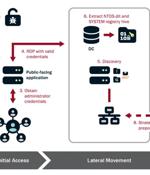Security News

The China-linked threat actor known as Evasive Panda orchestrated both watering hole and supply chain attacks targeting Tibetan users at least since September 2023. The end of the attacks is to...

The US Department of Justice on Wednesday revealed an indictment that charges a former Google employee with leaking the ad giant's AI tech to two Chinese companies - after easily defeating the Big G's security controls. The indictment names Linwei Ding, aka Leon Ding, and states that during his time at Google his job involved "Development of software that allowed GPUs to function efficiently for machine learning, AI applications, or other purposes required by Google or Google Cloud clients."

Concerned over the chance that Chinese-made cars could pose a future threat to national security, Biden's administration is proposing plans to probe potential threats posed by "Connected" vehicles made in the Middle Kingdom. The US president said he's putting the onus for sussing out the reality of the threat posed by Chinese automobiles on the Department of Commerce, which today said it issued an advanced notice of proposed rulemaking seeking public comment on the matter.

At least two different suspected China-linked cyber espionage clusters, tracked as UNC5325 and UNC3886, have been attributed to the exploitation of security flaws in Ivanti Connect Secure VPN...

Chinese PC maker Acemagic has admitted some of its products shipped with pre-installed malware. YouTuber The Net Guy found malware on Acemagic mini PCs when he tested them in early February.

A cache of stolen document posted to GitHub appears to reveal how a Chinese infosec vendor named I-Soon offers rent-a-hacker services for Beijing. Analysis of the docs by infosec vendor SentinelOne characterizes I-Soon as "a company who competes for low-value hacking contracts from many government agencies."

A Chinese-speaking threat actor codenamed GoldFactory has been attributed to the development of highly sophisticated banking trojans, including a previously undocumented iOS malware called...

The U.S. government on Wednesday said the Chinese state-sponsored hacking group known as Volt Typhoon had been embedded into some critical infrastructure networks in the country for at least five...

Volt Typhoon isn't the only Chinese spying crew infiltrating computer networks in America's energy sector and other critical organizations with the aim of wrecking equipment and causing other headaches, the US government has said. Last week, the FBI said it obtained search warrants and issued a remote kill command to wipe Volt Typhoon's botnet after the gang infected hundreds of end-of-life routers with backdoor malware to break into critical infrastructure networks.

The Chinese Volt Typhoon cyber-espionage group infiltrated a critical infrastructure network in the United States and remained undetected for at least five years before being discovered, according to a joint advisory from CISA, the NSA, the FBI, and partner Five Eyes agencies. Volt Typhoon hackers are known for extensively using living off the land techniques as part of their attacks on critical infrastructure organizations.